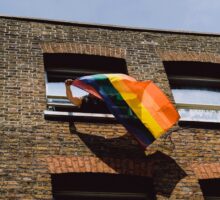
The 28th of June marked 51 years since the Stonewall Uprising, the historic demonstrations that began in a small bar in New York and went on to completely transform the ongoing struggle for LGBTQ+ rights.
50 years ago, the first anniversary of the rebellion was marked with marches across the United States. As LGBTQ+ rights have advanced, hundreds of Pride marches have taken place around the world. Last year’s Pride, celebrating the 50th anniversary of Stonewall, was attended by 5 million people in New York, and even more in São Paulo. In London, over 1.5 million took part!
This year, while organisers were gearing up to make Pride 50 the biggest one yet, the COVID-19 outbreak was sweeping across the globe, making it impossible to gather in large groups. As venues closed and festivals were cancelled, it became clear that Pride would look very different this year.
All in all, over 500 different Pride events were called off.
The official parades have been postponed until next year, but small crowds still took to the streets and parks in major cities to show their (socially distanced) support. But overwhelmingly, people were forced to adapt in ingenious ways to put on the first fully virtual but, in many ways, the most inclusive Pride in history.
Below are some of the ways that people managed to celebrate despite the limitations posed by Coronavirus:
Global Pride Goes Digital
On the 27th June, a coalition of key Pride organisations from around the world came together to put on Global Pride 2020: the world’s biggest digital celebration of LGBTQ+ people and culture.
The 24-hour non-stop livestream attracted hundreds of millions of participants across the globe, and featured a number of talks, films and performances from a broad array of musicians, performers, political leaders and social activists. Eurovision winner Conchita Wurst and London mayor Sadiq Khan were among the many famous figures taking part.
Global Pride 2020 was certainly the biggest virtual celebration, but it was far from the only one. Many organisations and publications took to Instagram Live to host panel discussions and concerts in support of LGBTQ+ rights and issues.
Keenly aware of how vital Pride-based fundraising is to their survival, these smaller groups took advantage of the donation tools built into various social media platforms. As numerous studies have shown, the COVID-19 pandemic has disproportionately affected the LGBTQ+ community, and charitable funds are needed now more than ever.
How Pride 2020 Made Space For Black Voices
In the past month, the deaths of Ahmaud Arbery, George Floyd, and Breonna Taylor sparked mass protests across the United States and throughout the world in solidarity, as black people demanded racial justice on an inspiring scale.
The organisers of Global Pride 2020 announced that Black Lives Matter would take centre stage in their programming, promising to amplify black voices during the course of their livestream. Among those voices were Orange Is The New Black actress and trans activist Laverne Cox, and Natalie Thompson, VP of Capital Pride Alliance and a Global Pride co-chair.
In London, thousands of people–including a significant number of BAME trans people and trans activists–gathered at Hyde Park Corner to voice their support for the Black Trans Lives Matter movement. For many, the wave of protests in America has underlined the importance of creating a truly intersectional Pride movement that fights for the rights of all oppressed and disenfranchised people.

How Brands Marked Pride (In The Middle Of A Pandemic)
Pride Month, and the parades and celebrations around it, has become a key focus for myriad brands in recent years. But many were left wondering if Coronavirus and the Black Lives Matter protests would put a major dent in corporate interest.
Sensitive to the serious public health concerns and calls for social justice, many companies found ways to remotely support LGBTQ+ causes without stealing the limelight from activists and community leaders.
Adidas continued its annual tradition of releasing a Pride-themed capsule collection, pledging $250,000 to the Trevor Project: the suicide prevention and crisis intervention charity. Sportswear giant Nike also put out a dedicated Pride range, and pledged half a million dollars to 20 different LGBTQ+ organisations.
And it wasn’t just trainers. Dozens of fashion brands, from ASOS to Levi’s, released a rainbow-hued assortment of clothing, often with 100% of proceeds going towards their chosen charities.
In recent years, some have questioned whether Pride is becoming too commercial; losing touch with its radical origins as more and more companies want a piece of the action. The muted atmosphere of this year’s celebrations let the organisers return Pride to its roots.
Stripped of the usual parades and parties, brands were forced to reflect on whether they were really doing all they could to uplift LGBTQ+ people. Were they helping out, or just cashing in? Fortunately, many rose to the challenge.
How Virtual Pride Gave A Home To Silenced LGBTQ+ Communities
For most of the millions of people who were looking forward to Pride this year, the disappointment was palpable. For them, a virtual Pride could never feel the same as taking to the streets. It is a chance to feel seen; to feel safe; to feel accepted.
For queer people living in countries that are actively hostile to the LGBTQ+ community, the thought of parading alongside their community is pure fantasy. Even if it was only online, virtual Pride gave these people an opportunity to feel seen and accepted, maybe for the first time in their lives.
As lockdown starts to lift, we have all been reflecting on how lonely we have felt while we made do with Zoom calls to stay connected with our loved ones. It is quite moving to think that for LGBTQ+ people in countries like Brunei and Saudi Arabia, where their sexuality is punishable by death, an online Pride was a means of bringing them into the global queer community.
If you would like to find out more about how you can support LGBTQ+ causes in the UK and beyond, please follow the link below:
https://www.stonewall.org.uk/about-us/news/lgbt-inclusive-organisations-you-should-know-about





